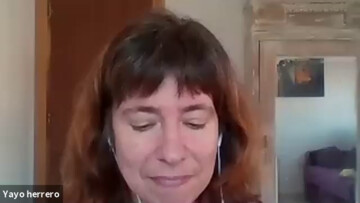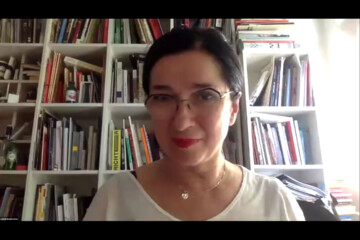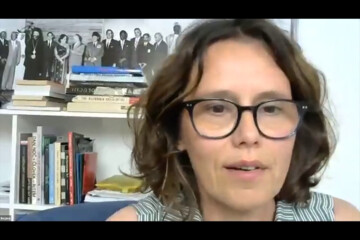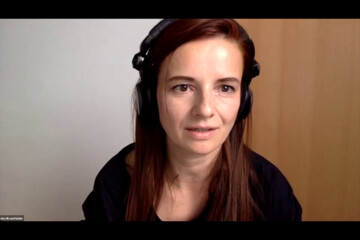| summary |
In the previous Commons seminar in June 2016, published in the first edition of the Glossary of Common Knowledge, we focused on the notions of commons “that encourage, celebrate and protect the right to diversity, signified by a decentralised structure, which moves away from ‘traditional’ methods of making artistic statements, protests, or social critiques in the globalised world”. Some of our narrators addressed commons as a verb, as an act of commoning that comes together as transnational solidarity in historical alliances and movements like the International Art Exhibition for Palestine, the Museo de la Solidaridad Salvador Allende, Artist of the World against Apartheid, or the Exhibition in Support of the Nicaraguan People. As calls for solidarity are essential in times of war, economic collapse, natural disasters and pandemics, these cases should help us to respond to our current state of exception and incite us to create alliances of solidarity to face the times to come. People come together in solidarity to undermine overarching repressive or violent political situations, find alternatives to exploitative economic conditions, or overcome distress after natural disasters. But calls for solidarity do not only appear as a reaction in times of exceptional hardship. Solidarity is at the core of our project as a society, as found in the labour movement, in feminism, and in the decolonisation processes all around the world. People in solidarity find common denominators by defining radical alternatives to the violence that divides them, enslaves them, pushes them to the private sphere, ignores them and deprives them. The current situation invokes the need for solutions (basic income, universal health care, free education) which stand against the reduction of aid to individual acts of charity that have no systemic implications. Individual acts may mitigate a fraction of the problem while perpetuating the cause of the social disease – global inequality in late capitalism. At present, biopolitics is in every move we make as the notions of private and public spaces and basic human rights have been under severe strain. The need for compliance and not defiance is presented as a personal responsibility to one’s fellow human beings, while the insidious bond between autocratic politics and economic stability by means of consumerism and a free-market economy nullifies any form of critical analysis. The perversion of hidden exploited labour (factory workers, warehouse workers) is moved even further from the eyes of the public, while everything continues to be available in the comfort of the private space, just one click away. The online communities of solidarity are impressive but at the same time show that we are predominantly communicating, organising and connecting with people we know, the familiar not the strange. The micropolitical (hyperlocal, translocal) perspective is important. However, we call for the unity of people, for the macro-political, to go beyond temporal mitigation of healthcare crises and economic crashes and propose sustainable social solutions for the fragile (refugees, migrant workers, victims of domestic violence, drug users, the sick, the old, the weak) in prolonged precarious situations. A sustainable solution today can only be a change on a planetary level, a change for us all.
Curators: Zdenka Badovinac, Bojana Piškur, Ida Hiršenfelder (Moderna galerija, Ljubljana, SI) & Jesús Carrillo (Madid, ES)
Coordination: Sara Buraya Boned (Museo Nacional Centro de Arte Reina Sofía, Madrid, ES) Advisors: Manuel Borja-Villel and Mabel Tapia (Museo Nacional Centro de Arte Reina Sofía, Madrid, ES)
Participating narrators: Zdenka Badovinac (Moderna galerija, SI), Miha Blažič - N'toko (Ljubljana, SI), Jesús Carrillo (Madid, ES), Kike España (Museo Nacional Centro de Arte Reina Sofía, ES), Magdalena Fragnito (Milano, IT), Jennifer Hayashida (Valand, Gothenburg, SE), Yolande Zola Zoli van der Heide (Vanabbe, Eindhoven, NL), Yayo Herrero (Madrid, SP), Gal Kirn (DE/SI), Javiera Manzi A. (Santiago, CL), Pablo Martínez (MACBA, Barcelona, ES), , Bojana Piškur (Moderna galerija, Ljubljana, SI), Theo Prodromidis (Athens, GR), Rasha Salti (LBN/DE), Natalia Sielewicz (Museum of Modern Art in Warsaw, PL), Onur Yıldız (SALT, Istanbul, TR), Joanna Zielińska (M HKA, Antwerpen, BE).
|
| venue |
Organised by Museo Nacional Centro de Arte Reina Sofía, Madrid, Spain and the L'Internationale confederation.
For safety reasons related to prevention of the spread of Covid-19 the seminar will take place online.
|
| date | 22 – 24 June 2020 |
| title | Antigones against the monsters of heartbreak. Imagine everyday utopias in times of pandemics |
| lecturer | Yayo Herrero |
| venue | live streaming / Zoom, Language: Spanish with simultaneous translation to English |
| date | Monday, 22 June 2020, at 6 p.m. |
COVID-19 arrives riding on a crisis of multiple interconnected dimensions that place humanity in a civilizing emergency. At the heart of the problem is a way of conceiving the economy, politics and culture at war with life. The magnitude of the problem is such that we are at a crossroads where the options that are taken determine the decent survival of most human beings and many other living beings. Imagining horizons of desire that may be compatible with the material conditions that make them possible is an urgent task. Ecofeminisms, decoloniality and the gaze of those that have historically been subjugated can make this imagination possible.




